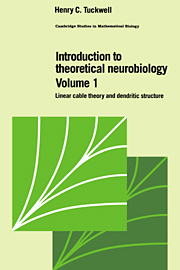Book contents
- Frontmatter
- Contents
- Preface
- 1 Introductory neuroanatomy and neurophysiology: the properties of motoneurons
- 2 The classical theory of membrane potentials
- 3 The Lapicque model of the nerve cell
- 4 Linear cable theory for nerve cylinders and dendritic trees: steady-state solutions
- 5 Time-dependent cable theory for nerve cylinders and dendritic trees
- 6 Rail's model neuron
- References
- Index
Preface
Published online by Cambridge University Press: 29 December 2009
- Frontmatter
- Contents
- Preface
- 1 Introductory neuroanatomy and neurophysiology: the properties of motoneurons
- 2 The classical theory of membrane potentials
- 3 The Lapicque model of the nerve cell
- 4 Linear cable theory for nerve cylinders and dendritic trees: steady-state solutions
- 5 Time-dependent cable theory for nerve cylinders and dendritic trees
- 6 Rail's model neuron
- References
- Index
Summary
This is the first of two volumes dealing with theories of the dynamical behavior of neurons. It is intended to be useful to graduate students and research workers in both applied mathematics and neurobiology. It would be suitable for a one-quarter or one-semester course in quantitative methods in neurobiology.
The book essentially contains descriptions and analyses of the principal mathematical models that have been developed for neurons in the last 30 years. Chapter 1, however, contains a brief review of the basic neuroanatomical and neurophysiological facts that will form the focus of the mathematical development. A number of suggestions are made for further reading for the reader whose training has been primarily mathematical.
The remainder of the book is a mathematical treatment of nerve-cell properties and responses. From Chapter 2 onward, there is a steady increase in mathematical level. An attempt has been made to explain some of the essential mathematics as it is needed, although some familiarity with differential equations and linear algebra is desirable. It is hoped that physiologists will benefit from this method of presentation. Biophysicists, engineers, physicists, and psychologists who are interested in theoretical descriptions of neurons should also find this book useful.
From Chapter 2 onward, the theme is the systematic development of mathematical theories of the dynamical behavior of neurons. The fundamental observation is of the resting membrane potential. Hence Chapter 2 is mainly concerned with the passive properties of cells and is an exposition of the classical theory of membrane potentials (i.e., the Nernst–Planck and Poisson equations).
- Type
- Chapter
- Information
- Introduction to Theoretical Neurobiology , pp. x - xiiPublisher: Cambridge University PressPrint publication year: 1988

